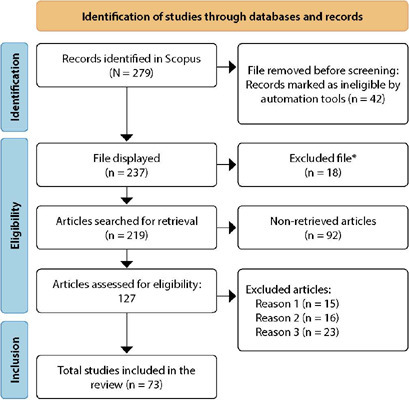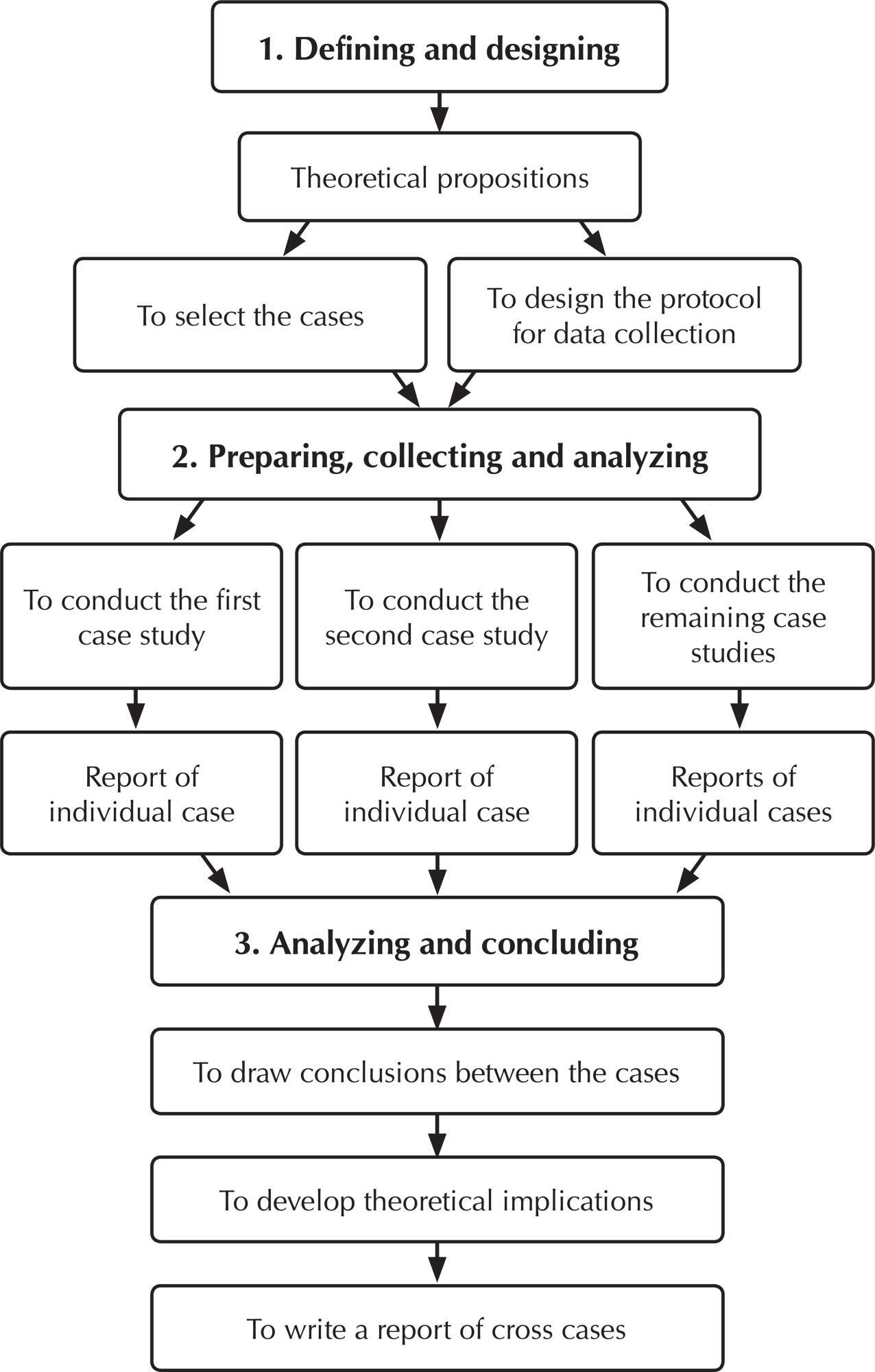-
REVIEW
Critical analysis of the scientific production on Jean Watson’s Theory of Human Care
Revista Brasileira de Enfermagem. 2024;77(2):e20230231
06-14-2024
Resumo
REVIEWCritical analysis of the scientific production on Jean Watson’s Theory of Human Care
Revista Brasileira de Enfermagem. 2024;77(2):e20230231
06-14-2024DOI 10.1590/0034-7167-2023-0231
Visualizações0Ver maisABSTRACT
Objectives:
to analyze current scientific production on the use of the theoretical-methodological precepts of Jean Watson’s Theory of Human Care/Clinical Caritas Process.
Methods:
quantitative, exploratory, descriptive study using data from 1979 to 2023 in the Scopus database. Analysis was carried out using VOSviewer software.
Results:
the 73 studies included establish a network of collaboration among 221 authors from 155 institutions in 18 countries, who discuss the development of ethical behavior in nursing staff, through technical improvement, implementation, and validation of instrumental strategies capable of measuring and evaluating the quality of holistic and empathetic care. The Theory of Human Caring contributes to nursing training and care, and Process Clinical Caritas-Veritas is useful for the different possibilities of practice and education.
Conclusions:
it is important to strengthen with more empirical data a nursing work model centered on individual human care, supporting the evolution of scientific nursing knowledge.

-
ORIGINAL ARTICLE
Methodological path to reach the degree of saturation in qualitative research: grounded theory
Revista Brasileira de Enfermagem. 2022;75(2):e20201379
10-18-2022
Resumo
ORIGINAL ARTICLEMethodological path to reach the degree of saturation in qualitative research: grounded theory
Revista Brasileira de Enfermagem. 2022;75(2):e20201379
10-18-2022DOI 10.1590/0034-7167-2020-1379
Visualizações0Ver maisABSTRACT
Objectives:
to achieve the degree of saturation in study that applied the grounded theory.
Methods:
qualitative research, carried out in four Family Health Units, between June 2018 and May 2019. The data from the interviews with 30 health professionals and non-participant observation were coded in the stages: open, axial and integration.
Results:
the degree of saturation was achieved by two conceptual models - theoretical saturation and inductive thematic. Theoretical saturation was considered: the development of conceptual codes and observation, in the collection and analysis of data, when they generated new categories/subcategories or only indicated increasing instances. For thematic inductive saturation, the use of new codes based on each interview stood out.
Final Considerations:
the visual layout for the number of codes, the theoretical scope of the concepts and the delimitation of the sample groups guided the identification of the degree of saturation for the development of the conceptual body that supported the substantive theory.
-
REFLECTIVE
Convergent care research and its qualification as scientific research
Revista Brasileira de Enfermagem. 2021;74(1):e20190657
02-22-2021
Resumo
REFLECTIVEConvergent care research and its qualification as scientific research
Revista Brasileira de Enfermagem. 2021;74(1):e20190657
02-22-2021DOI 10.1590/0034-7167-2019-0657
Visualizações0Ver maisABSTRACT
Objectives:
to highlight the main attributes of Convergent Care Research that ratify it as a method of scientific research. Methods: it is a theoretical-reflective study on Convergent Care Research's theoretical-methodological assumptions. Development: Convergent Care Research is compatible with the Social Constructionism paradigm. Convergent Care Research projects have two approaches: practical and conceptual. The Convergent Care Research process corpus contains five phases: conception; instrumentation; scrutiny; analysis and theorizing. Final Considerations: Convergent Care Research rigor encompasses the relationship between research and care practice, and this corresponds to the convergence of these two dimensions. Due to its theoretical foundation and criteria of methodological rigor, Convergent Care Research is aligned with scientific research methods.
-
REVIEW
Validation methods of nursing protocols: an integrative review
Revista Brasileira de Enfermagem. 2020;73(suppl 5):e20200050
10-19-2020
Resumo
REVIEWValidation methods of nursing protocols: an integrative review
Revista Brasileira de Enfermagem. 2020;73(suppl 5):e20200050
10-19-2020DOI 10.1590/0034-7167-2020-0050
Visualizações0Ver maisABSTRACT
Objective:
to identify scientific production about validation methods of nursing care protocols.
Method:
an integrative review with search at Scielo, Pubmed/MEDLINE, Virtual Health Library, Web of Science, Scopus, and EBSCOhost. The descriptors “validation studies”, “validation studies as topic”, “protocols”, “clinical protocols”, “practice guidelines as topic”, “nursing” and “nursing assessment” and the uncontrolled descriptor “validation” were used.
Results:
thirty-two articles were selected, most of them Brazilian. Content validation by experts was the most frequent method, with no consensus on the number of participants for the process. The collection instruments were mostly created by the authors. Data analysis was performed using descriptive statistics and Content Validity Index, with a variable consensus rate in the analyzed articles.
Conclusion:
protocols validated by experts are robust tools for use in clinical practice, with methodological rigor in development essential for its quality.

-
REFLECTIVE
Research-interference: a nomad mode for researching in health
Revista Brasileira de Enfermagem. 2019;72(2):571-576
04-18-2019
Resumo
REFLECTIVEResearch-interference: a nomad mode for researching in health
Revista Brasileira de Enfermagem. 2019;72(2):571-576
04-18-2019DOI 10.1590/0034-7167-2018-0553
Visualizações0Ver maisABSTRACT
Objective:
to discuss search-interference, whose processes are related to the field of health and the social field.
Method:
theoretical essay used as basis in the philosophy of difference represented by the philosophers Baruch Espinosa and Gilles Deleuze.
Results:
the present reflection resulted from the meeting of studies from the nursing field that deal with the production of knowledge based on the interference mode. The endeavor of crossing studies produced a theoretical composition presented in three plateaus: interference, a research that welcomes the In-World Experiences; a way of producing researchers; and a nomad mode in health research.
Final Consideration:
search-interference can be considered as a nomad ethical and political mode for producing research whose consistence plan is provisory, rhizomatic and the result of meetings, forces, intensities and affects produced in the research field.
-
REVISÃO
Musculoskeletal symptoms in nursing students: concept analysis
Revista Brasileira de Enfermagem. 2019;72(1):287-292
01-01-2019
Resumo
REVISÃOMusculoskeletal symptoms in nursing students: concept analysis
Revista Brasileira de Enfermagem. 2019;72(1):287-292
01-01-2019DOI 10.1590/0034-7167-2018-0612
Visualizações0ABSTRACT
Objective:
to analyze the musculoskeletal symptomatology concept in undergraduate nursing students through Rodgers' evolutionary method.
Method:
An integrative review of the literature was performed for the identification and selection of ten articles. A concept analysis was performed according to Rodgers' evolutionary method. Article search was performed using the EBOSCO Host platform, Virtual Health Library and Google scholar for the years from 2004 to 2018.
Results:
Based on the 3 elements of Rodgers model we found: 1) substitute terms and related concepts, where musculoskeletal disorders and musculoskeletal symptoms were highlighted; 2) as essential attributes of the concept we highlight pain and discomfort, as well as, measurement using the Nordic Musculoskeletal Questionnaire; and 3) risk factors were identified as antecedents, and the consequences were the impact on students' lives.
Conclusions:
This study contributes to the knowledge and clarification of the concept of musculoskeletal symptomatology in nursing students.
Palavras-chave: Concept FormationHealth EducationMethodsMusculoskeletal Physiological PhenomenaNursing StudentsVer mais -
REFLECTIVE
Operationality of concepts in Heideggerian phenomenological investigation: epistemological reflection on Nursing
Revista Brasileira de Enfermagem. 2019;72(1):304-308
01-01-2019
Resumo
REFLECTIVEOperationality of concepts in Heideggerian phenomenological investigation: epistemological reflection on Nursing
Revista Brasileira de Enfermagem. 2019;72(1):304-308
01-01-2019DOI 10.1590/0034-7167-2017-0941
Visualizações0Ver maisABSTRACT
Objective:
To describe the investigative path of analysis and the operationality of concepts based on Martin Heidegger's theoretical and philosophical framework.
Method:
Theoretical reflection on the phenomenon of pregnancy in a woman with heart disease.
Results:
Stages of the investigative movement were evidenced based on the pre-reflection related to the object of study and to the search for the phenomenal meaning, using the existential and analytical Hermeneutics as the approach and resulting in the reach of the phenomenal totality.
Conclusion:
The worldview of the researcher, who considered the subjectivities of the person in a health or disease situation, favored the announcement of the referential by the object of study. Knowledge production in the light of Martin Heidegger's phenomenology unveiled phenomena lived and experienced in the Health and Nursing field, provided of epistemological rigor that demanded appropriation of concepts inherent to the existential analytics.

-
EXPERIENCE REPORT
Multiple case study applied in nursing research: a case report
Revista Brasileira de Enfermagem. 2018;71(3):1194-1197
01-01-2018
Resumo
EXPERIENCE REPORTMultiple case study applied in nursing research: a case report
Revista Brasileira de Enfermagem. 2018;71(3):1194-1197
01-01-2018DOI 10.1590/0034-7167-2017-0066
Visualizações0Ver maisABSTRACT
Objective:
To report the experience of using the method of multiple case study.
Method:
We used the method of multiple case study, conducted with children and adolescents assisted in the pediatric oncology inpatient unit.
Results:
The steps used for the development of a multiple case study were: Step 1 - Define and design; Step 2 - Prepare, collect and analyze; Step 3 - Analyze and complete. The steps included the development of a research project with the definition of its components, preparation of protocol for the case study, data collection, individual report of cases, data analysis and final report with data cross-referencing.
Conclusion:
The case study method can be used by nurses and contribute to the advancement in knowledge of nursing as a science and therefore contribute to a full care practice in the context in which the phenomenon happens.




